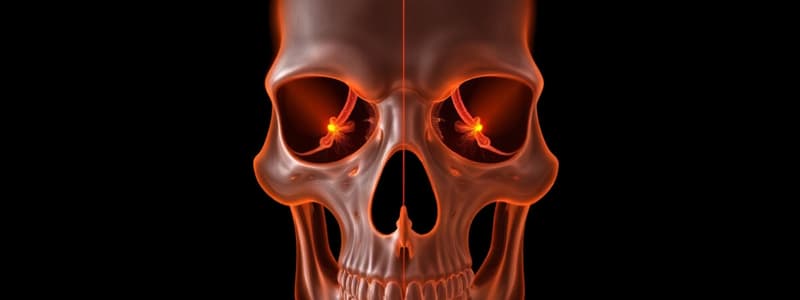Podcast
Questions and Answers
What is a key feature of an optimal lateral facial bones image?
What is a key feature of an optimal lateral facial bones image?
- It should focus solely on the nasal cavity.
- It should include the frontal sinus. (correct)
- It should showcase the occipital bone.
- It should highlight the mandible only.
Which of the following does NOT need to be visible in a lateral facial bones image?
Which of the following does NOT need to be visible in a lateral facial bones image?
- Maxillary sinus
- Sphenoid sinus (correct)
- Frontal sinus
- Zygomatic bone
In addition to the facial bones, what other structure is essential to include in the image?
In addition to the facial bones, what other structure is essential to include in the image?
- Frontal sinus (correct)
- Temporal bone
- Cervical vertebrae
- Pelvic bones
Which of the following statements about a lateral facial bones image is accurate?
Which of the following statements about a lateral facial bones image is accurate?
What is the significance of including the frontal sinus in a lateral facial bones image?
What is the significance of including the frontal sinus in a lateral facial bones image?
Flashcards
Lateral Facial Bones
Lateral Facial Bones
The bones forming the sides of the face, including parts of the eye socket and cheekbone areas.
Facial Bones Sinuses
Facial Bones Sinuses
Air-filled spaces within the facial bones.
Frontal Sinus
Frontal Sinus
A sinus located within the frontal bone, above the eyebrows.
Image Characteristics
Image Characteristics
Signup and view all the flashcards
Study Notes
Lateral Facial Bones - Essential Image Characteristics
- A lateral facial view image should include all facial bones, including the maxilla, zygomatic bone, nasal bones, and mandible.
- The image should clearly depict the structures of the sinuses, including the frontal sinus.
- The radiograph should show the relationships between the various facial bones and their articulations.
- Precise visualization of the frontal sinus and its borders are crucial.
- The image should demonstrate the normal bony architecture and density of the facial bones.
- Anatomical landmarks for identification are important, such as the infraorbital rims, zygomatic arches, and nasal bones.
- Presence of any fractures or abnormalities in the facial bones should be depicted in the image.
- Positioning of the image should ensure avoidance of distortion or superimposition of structures, for accurate interpretation.
- A clear depiction of the soft tissue surrounding the facial bones is important for evaluating potential swelling or other soft tissue abnormalities.
- The quality and clarity of the image will affect the radiologist's ability to diagnose. This includes image resolution, contrast, and sharpness.
- Proper patient positioning is paramount; a slight deviation can affect interpretation.
- The image acquisition technique (e.g., projection, focal film distance) should be appropriate and produce an interpretable radiograph.
- The displayed image should demonstrate a quality that allows for identification of any potential pathology or anatomical variations as they relate to the facial bones and sinuses.
- Clarity and contrast of the sinuses and air content within them should be highlighted in the image.
- The image should show the smooth, continuous bony margins distinguishing normal bone from any abnormal thickening or bony irregularity.
- The image should encompass the entire region, including the bony structures of the eyes and orbits.
- Proper identification of the margins of the different sinus cavities is required, such as the ethmoid sinus, which might be visible within the context of the broader lateral facial view. This particular sinus isn't always fully apparent but should be included within the possible range of views if present.
- The image needs to show the normal relationships between the teeth and surrounding jaw structures (e.g., alveolar processes, and the maxilla/mandible).
- The image should show the normal bony density and contour of the facial bones. Variations can indicate disease or developmental anomalies.
- It should accurately depict the position and orientation of all relevant facial structures for clear interpretation.
Studying That Suits You
Use AI to generate personalized quizzes and flashcards to suit your learning preferences.




